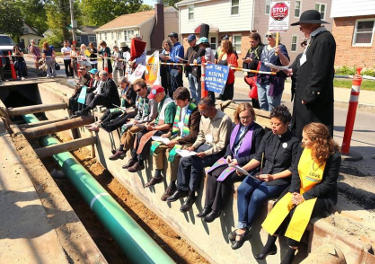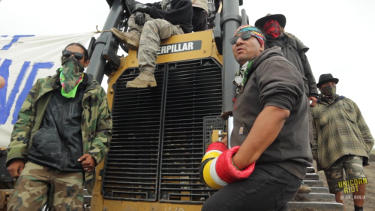Principles of Climate Civil Resistance

Clergy arrested at Spectra construction site
Civil resistance is a form of non-violent opposition to oppression, injustice, and environmental harm. It is carried out by ordinary people and social movements. In the context of climate change, civil resistance against the fossil fuel system is justified by law, morality, and the long-term interests of the planet and its people; it is grounded in the ongoing violations of our federal and state governments in abetting corporate degradation of the climate; and it is demanded by the need to build a new society in which equity and ecological sustainability replace the corruption and violence of the current regime. The right to engage in civil resistance is premised upon fundamental and undeniable rights to a healthy planet and a just future.
We live in an age of climate crisis. Changes to atmospheric composition, caused primarily by the combustion of fossil fuels, are producing widespread sea level rise, extreme weather, drought, and widespread social and political dislocation. Accelerated warming will continue for at least several decades, disproportionately affecting the most vulnerable people on the planet. While climate instability at a massive scale is already inevitable, further carbon emissions ensure an ever more catastrophic outlook for the future.
The climate crisis is a social crisis. Two centuries of the extraction of gas, oil, and coal have occurred within a system of exploitation and a general assault on non-human nature. While the use of fossil fuels has provided material gains, it has driven excessive consumption and economic inequality, producing harms that now far outweigh its benefits. The continued extraction of these fuels, despite clear evidence of their poisonous nature and the ready availability of alternatives, serves to enrich the ruling class at the expense of the poor, the planet, and future generations. Continued use of fossil fuels magnifies inequalities and reinforces hierarchies—including those based on race, gender, class, sexuality, ability, and other identities—that are endemic to the established order.
Communities and activists in the United States and around the world have waged this struggle for years and have articulated the urgency of resistance. While recognizing the historical injustices of our present political system and the right of self-determination for Indigenous nations within the borders of the United States—as well as the contradictions and limitations of the American legal system—it may be useful to consider the legal justifications for civil resistance against the fossil fuel system. The following principles of climate civil resistance are intended as a resource for individuals and communities engaged in the struggle to combat climate change with climate justice.
The Fossil Fuel System
Addiction to fossil fuels is a designed dependence. Governments and fossil fuel companies work together to ensure that production is profitable and that the price of extracting, refining, transporting, and burning fossil fuels is borne primarily by its victims. Those who benefit most from this process—private profiteers and their public protectors—claim energy use is a matter of consumer choice. For decades they have deflected responsibility, withheld climate science from the public, and directed attention away from the political-institutional apparatus undergirding the fossil fuel system. Their consolidation of political control has distorted democratic processes and insulated them from the popular will.
Government and civil society have proven incapable of meeting this challenge. Decades of efforts to convince public institutions and corporations to abandon their destructive behavior have failed, culminating in the absurd but telling fact that, after years of record-setting temperatures and extreme weather, the most powerful government on earth now denies the very reality of climate change. It is too late to wait for executives, legislatures, or agencies—often co-opted by the very industries they are charged with regulating—to recognize the necessity of action.
The Right to Resist
Any claimed legal entitlement to extract, transport, and sell fossil fuels is presumptively invalid. There is no right to wreak havoc on the planet and its people. To the contrary, by failing to address the climate crisis and by perpetuating the fossil fuel system, corporations and governments have violated state, federal, and international law.
These extraordinary violations produce a right to resist on the part of the people. Popular consent is the predicate of democratic governance and may be revoked when the institutions of government have lost their allegiance to the public. The basic right of the people to replace a corrupt regime with a new social order based on justice and equality is immutable and requires no legal sanction.
The law recognizes this principle of just resistance. The doctrine of necessity, by which individuals are justified in violating the letter of the law to serve a greater interest, has been ratified for millennia by legal codes and traditions, including by the American common law and the statutes of various states. Laws recognizing the right to defend self, others, and property furnish additional justifications for resistance. The Universal Declaration of Human Rights asserts that the people “have recourse, as a last resort, to rebellion against tyranny and oppression,” and our nation’s founding documents are premised upon the principle of resistance to unjust rule.
Sources and Principles of the Right to Climate Civil Resistance
The Declaration of Independence and the Constitution of the United States

KXL White House protest, March 2, 2014
- The Declaration of Independence holds that governments are established to secure the people’s rights to “life, liberty, and the pursuit of happiness.” By actively promoting the burning of greenhouse gases and accompanying harms, and with full knowledge of the effects of the fossil fuel system, federal and state governments have worked against these interests, ensuring injury to public health, welfare, and property. At the same time, these governments have defended, often violently, the destructive behavior of fossil fuel corporations. By promoting this injustice, federal and state governments divest themselves of the “consent of the governed.”
- The Fifth Amendment of the United States Constitution provides that no person shall “be deprived of life, liberty, or property, without due process of law.” By promoting and defending the fossil fuel system, the United States government has compromised the life, liberty, and property of current vulnerable populations and all future generations, exposing them to climate disruption, sea level rise, and social dislocation. Bound by their obligation under the Fourteenth Amendment to respect due process of law, the governments of the states have likewise acted illegally in furthering the injuries of the fossil fuel system.
- The Fourteenth Amendment guarantees “equal protection” under the law. By deliberately shifting the burden of profit-making fossil fuel activity onto poor people, people of color, Indigenous populations, and future generations, federal and state governments have unjustly used their legal authority to expose our most vulnerable communities to the greatest risks of the climate crisis.
The Public Trust
- Federal and state governments are bound to protect those aspects of non-human nature, such as air, water, and climate, that are necessary to support the life and welfare of the people. The role of government as trustee for the public trust of precious natural resources has long been recognized by sovereigns around the world and by the courts of this country. In addition to their duty to protect a stable climate—without which human society is impossible—federal and state governments are obligated to defend ecosystems harmed by global warming and by the extractive industries that cause it. By instead actively promoting the harmful activities of fossil fuel corporations, and by permitting the widespread degradation and destruction of entities protected by the public trust, federal and state governments have violated their duties to the public.
Rights to Local Government and Self-Determination
- The right of local communities to govern themselves and to resist the harmful practices of the fossil fuel system is guaranteed by the Declaration of Independence, which establishes government for the purpose of serving the interests of the people, and by the Ninth Amendment to the Constitution, which reserves all unenumerated rights to the people. Local communities are thus empowered to protect the right to a healthy climate and to defend against encroachments by the fossil fuel system. Ignoring this authority, federal and state governments have invoked spurious “corporate rights” to impose fossil fuel infrastructure projects and pollution on local communities against their will and in spite of their resistance. Such abuses are a direct violation of the duty to respect the self-determination of the people.
Rights of Indigenous Peoples
- Government support of the fossil fuel system has relied upon a wholesale violation of federal treaty obligations toward Indigenous communities, including the permitting of fossil fuel infrastructure projects on tribal lands and the violation of rights to self-determination and religious freedom. The federal government has also violated its commitments under the American Declaration of the Rights of Indigenous People, which recognizes that “Indigenous peoples have the right to live in harmony with nature and to a healthy, safe, and sustainable environment,” as well as “the right to conserve, restore, and protect the environment and to manage their lands, territories and resources in a sustainable way.”
The Universal Declaration of Human Rights
- The Universal Declaration of Human Rights recognizes each individual’s “right to life, liberty and security of person,” the “right to . . . economic, social and cultural rights indispensable for [their] dignity and the free development of [their] personality,” and the entitlement to “a social and international order in which the rights and freedoms set forth in this Declaration can be fully realized.” By promoting and protecting a fossil fuel system that directly undermines these guarantees, and by enforcing a social order that degrades the climate for the benefit of the wealthy, federal and state governments have violated the people’s basic human rights.
International Treaties
- Under the United Nations Framework Convention on Climate Change, the United States is legally bound to “prevent dangerous anthropogenic interference with the atmosphere.” It is also required under the International Covenant on Civil and Political Rights to maintain “conditions . . . whereby everyone may enjoy [their] civil and political rights, as well as [their] economic, social, and cultural rights.” By directly contributing to the emission of dangerous levels of carbon dioxide and by undermining the conditions for a stable society, despite full knowledge of the harms of climate change, the federal government has violated these international treaty obligations.
Customary International Law
- It is a basic principle of international law that states must prevent their territory from being used in such a way as to cause environmental harms in other nations. This “no-harm” principle requires countries to prohibit public and private activity causing injuries elsewhere. By promoting the extraction and combustion of fossil fuels within its own borders, and by encouraging the efforts of American corporations to expand the fossil fuel system abroad, the United States has flagrantly violated the no-harm principle.
Rights of non-human entities
- In accord with the growing recognition that humans and non-humans form a unitary natural community and that a just society is impossible without proper regard for animals, plants, and ecosystems, the rights of non-human entities must be respected. These rights, implicit in the Ninth Amendment, the public trust doctrine, and laws protecting the environment, are recognized by the Universal Declaration of the Rights of Mother Earth and include the “right to life and to exist,” “the right to be respected,” and the “right to full and prompt restoration” for violations. By subsidizing and permitting the widespread destruction and damage of non-human entities through fossil fuel extraction, federal and state governments have violated these rights.

KXL White House protest, March 2, 2014
These legal principles (and others which may be articulated or developed) illustrate a right to non-violently resist the fossil fuel system and the actions of federal, state, and local governments that support it. This resistance is justified by the extreme and existential threat of climate change to all human and non-human life. The right of resistance is further grounded in justice, morality, and the right of the people to withdraw their consent from a government that works against their interests.
Whatever form this non-violent resistance takes—and it is already underway in communities across the world—those confronting the fossil fuel system stand justified in their fight for a better world.
Read three inspiring acts of climate resistance:
Consider supporting our work by joining our mailing list below, sharing & "liking" this page, and following us on social media.
